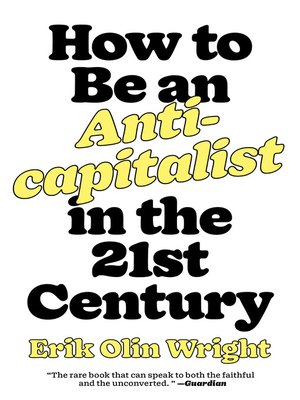
Sign up to save your library
With an OverDrive account, you can save your favorite libraries for at-a-glance information about availability. Find out more about OverDrive accounts.
Find this title in Libby, the library reading app by OverDrive.



Search for a digital library with this title
Title found at these libraries:
| Library Name | Distance |
|---|---|
| Loading... |
What is wrong with capitalism, and how can we change it?
Capitalism has transformed the world and increased our productivity, but at the cost of enormous human suffering. Our shared values—equality and fairness, democracy and freedom, community and solidarity—can provide both the basis for a critique of capitalism and help to guide us toward a socialist and democratic society.
Erik Olin Wright has distilled decades of work into this concise and tightly argued manifesto: analyzing the varieties of anticapitalism, assessing different strategic approaches, and laying the foundations for a society dedicated to human flourishing. How to Be an Anticapitalist in the Twenty-First Century is an urgent and powerful argument for socialism, and an unparalleled guide to help us get there. Another world is possible. Included is an afterword by the author’s close friend and collaborator Michael Burawoy.
Capitalism has transformed the world and increased our productivity, but at the cost of enormous human suffering. Our shared values—equality and fairness, democracy and freedom, community and solidarity—can provide both the basis for a critique of capitalism and help to guide us toward a socialist and democratic society.
Erik Olin Wright has distilled decades of work into this concise and tightly argued manifesto: analyzing the varieties of anticapitalism, assessing different strategic approaches, and laying the foundations for a society dedicated to human flourishing. How to Be an Anticapitalist in the Twenty-First Century is an urgent and powerful argument for socialism, and an unparalleled guide to help us get there. Another world is possible. Included is an afterword by the author’s close friend and collaborator Michael Burawoy.







